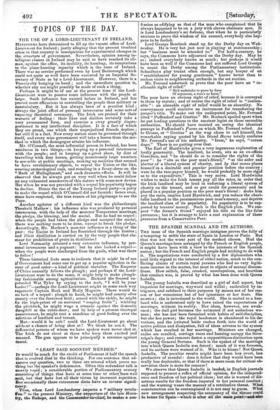"LEAST SAID SOONEST MENDED."
IT would be much for the credit of Parliament if half the speech that is evolved died in the thinking. For one sentence that ad- Asinces any question, two or three are uttered which prove no- thing but the speaker's deficiencies. Often this redundant talk is merely vapid; a considerable portion of Parliamentary oratory Consisting of things. that have at some time or other been well but that have lost all their virtue by incessant repetition. But occasionally these extraneous dicta have an inverse signifi- Caney. 1Thas, when Lord Londonderry imputes a "military revolt'. fowl' to the present Ministry, the supporters of the late Minis- IV, the Bishops, and the Commander-in-chief, he makes a con- fession as edifying as that of the man who complained that ha always happened to be on a jury with eleven obstinate men. It is Lord Londonderry's mi fortune that when he is particularly anxious to prove the wisdom of his counsel, everybody else hap- pens to be foolish.
Lord George Bentinck stood up for the Derby day on Wed- nesday. He is very hot just now in playing at statesmanship; but " business must be attended to." For half-a-century, he says, the Commons have adjourned on the Derby day. May be so ; indeed everybody knows as much ; but perhaps it would have been as well if the Commons had not suffered Lord George to count the Derby among the Parliamentary institutions. Schoolboys play truant often enough, but any keeper of an " establishment for young gentlemen " knows better than to reckon visits to neighbouring orchards in the set routine.
Mr. Ferrand undertook to prove that the poor have an "in- alienable right of relief."
" He'd undertake to prove by force Of argument, a man's no horse."
The poor have an obvious right of relief, because it is conveyed to them by statute; and of course the right of relief is "inalien- able" : an alienable right of relief would be an absurdity. No conveyancer could contrive an instrument for transferring the pauper's title. To make out the undisputed point, Mr. Ferrand cited " Puffendorf and Grotius." Mr. Roebuck spoiled sport when he put leading questions to the amateur legist on those recondite authorities. He should have insisted on seeing the identical passage in Puffendorf's Poems on which Mr. Ferrand relied. As to Grosse, or " Grotius " as the wag chose to call himself, the remarkable saying quoted by his friend Burns totally confutes Mr. Ferrand's use of his authority. " Iram," he says, "corum dago." There is no getting over that.
The Earl of Hardwicke gives a very ingenuous explanation of lordly generosity. The landlord, he avers, sits as an ex-officio Guardian, and he should do so to consider the rights of the poor " : he "sits as the poor man's friend," "as the eider and abettor of a liberal system of charity, and by that means places himself in a desirable and popular position before the country : were he the rate-payer hiniseif, he would probably be more rigid as to the expenditure." This is very naive. Lord Hardwicke wishes to make the Irish tenant pay all the rates, in order that the Irish landlord may be loud in enforcing a liberal system of charity on the tenant, and so get credit for generosity and be i placed in a popular position as the poor man's friend : make him pay the rates, implies Lord Hardwick, and you reduce the chari- table landlord to the parsimonious poor man's enemy, and deprive the landlord class of its popularity. Its popularity is to be sup- ported by tenants' money. Such is the English plan. We sus- pect " the farmer's friend " enjoyed his title on the like false pretences ; but it is strange to have a cool explanation of these processes from a Conservative Peer.


























 Previous page
Previous page